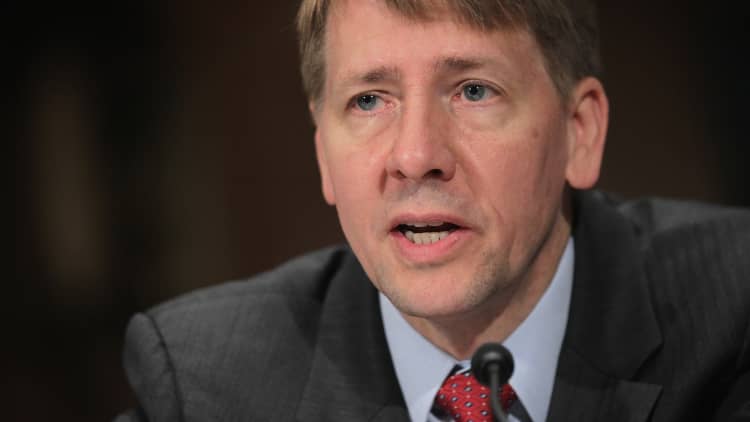
With Richard Cordray leaving the Consumer Financial Protection Bureau, consumer advocates are worried about what's next for customers.
Cordray, 58, director of the CFPB, a federal watchdog of financial services firms, announced he would leave the agency by the end of November.
His departure isn't a surprise, as Republican lawmakers have .
"[The CFPB] has been a real political football since its inception, and it will likely look and operate quite differently once Cordray leaves," said Matt Schulz, senior industry analyst for CreditCards.com.
Earlier this year, in an interview with CNBC, House Financial Services Chairman Jeb Hensarling, R-Texas, called the CFPB a "rogue agency" and complained about the power Cordray has as one person overseeing an entire bureau.
See below for footage.
Republicans have also pushed for a five-member commission to run the CFPB. Sen. Deb Fischer R-Nebraska, proposed a bill earlier this year to do just that.
Cordray was near the end of his five-year term, which would have expired in July 2018.
What's next?
In the meantime, President Donald Trump has the power to nominate a replacement, which is now raising concerns among consumer advocacy groups.
"We'll be watching President Trump closely," said Lisa Gilbert, vice president of legislative affairs at Public Citizen, a consumer watchdog group.
"This agency has been important for consumers," she said. "We're really thrilled at its track record, and we're worried that having a less effective director could be meaningful."
Lauren Saunders, associate director at the National Consumer Law Center, echoed that sentiment.
"We'll see who Trump will nominate," she said. "He talked about how the system is rigged, and what the agency does is unrig the system."
Here are a few of the CFPB's accomplishments over the last six years, since its creation by the Dodd-Frank Act.
The hits
The agency has given jilted consumers a place to file their grievances, establishing a consumer complaint database.
"The mission is popular and it's given a real place for consumers to share complaints," said Gilbert of Public Citizen. There are over 700,000 listed on the site.
Consumers have received $11.8 billion in relief from CFPB supervisory and enforcement actions.
Notable wins for the CFPB include its $100 million fine against Wells Fargo Bank last year for its practice of opening unauthorized deposit accounts and credit cards. Employees at the bank received incentives for opening the phony accounts in order to hit sales targets.
The agency also targeted payday lenders and other purveyors of high interest loans. Some of these short-term credit products had annual percentage rates exceeding 300 percent.
Last month, the CFPB finalized a rule that requires lenders to determine whether customers can afford to repay these payday loans without borrowing even more.
On the student loan front, the CFPB sued Navient, the nation's largest servicer of student loans, in January for complicating the repayment process for borrowers.
In its suit, the agency claimed that Navient failed to correctly apply borrowers' payments to their accounts and failed to inform borrowers of deadlines related to income-driven repayment plans.
Navient did not immediately return a call requesting comment.
Finally, the CFPB kicked off a mortgage initiative to help borrowers understand their rights and obligations when buying a home.
This rule, known as "Know Before You Owe," requires lenders to provide simplified details on mortgages to homebuyers to help them shop for a loan that's right for them.
More from Personal Finance


